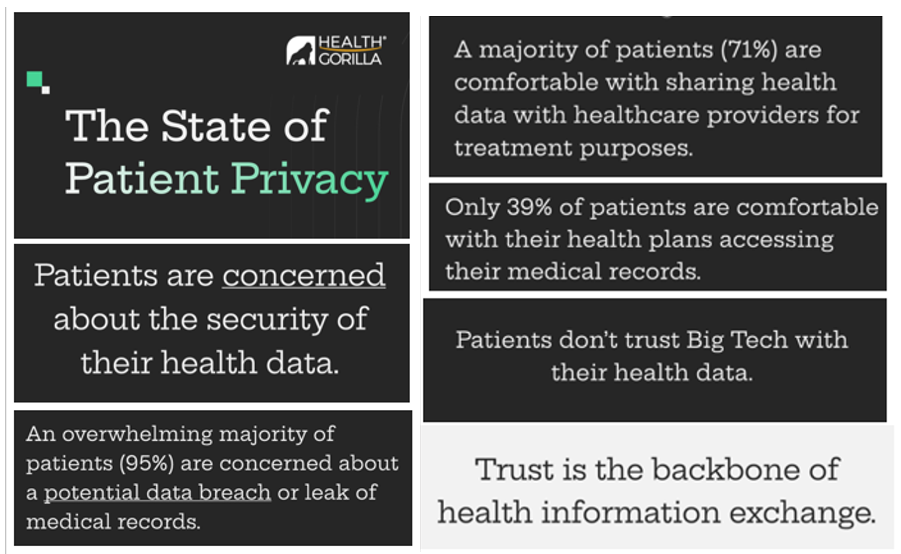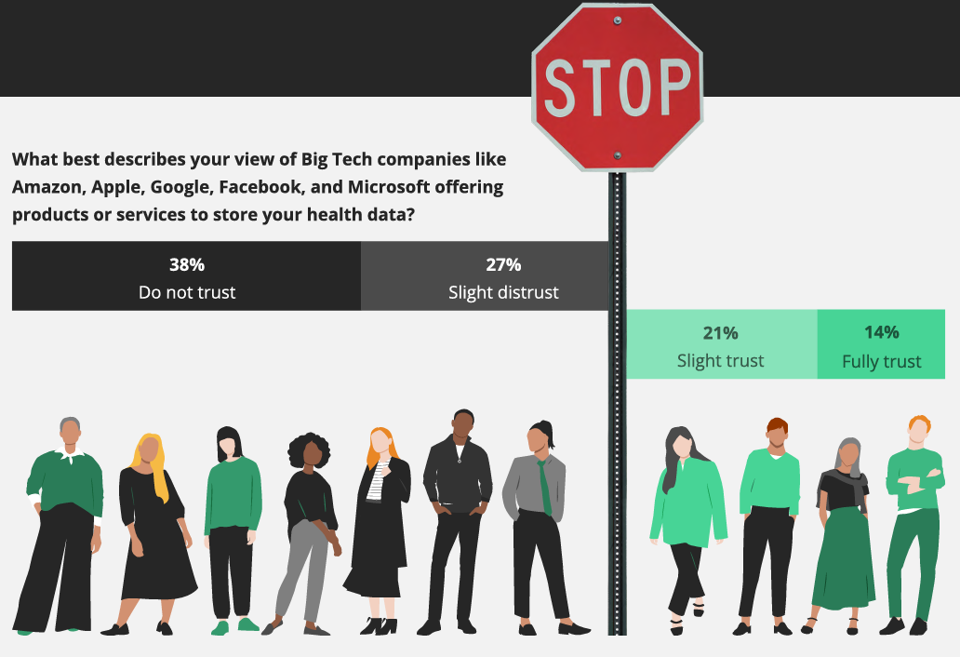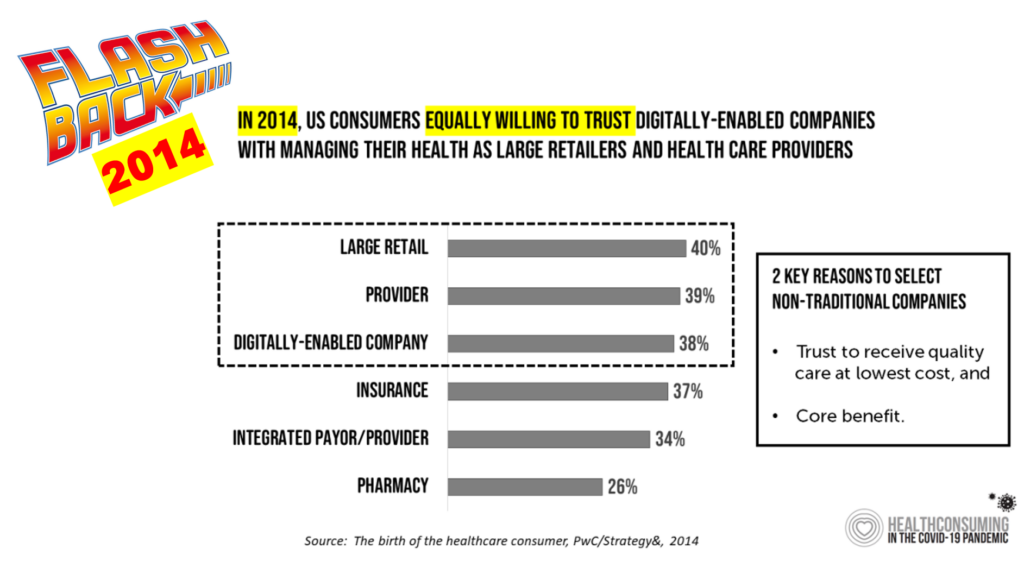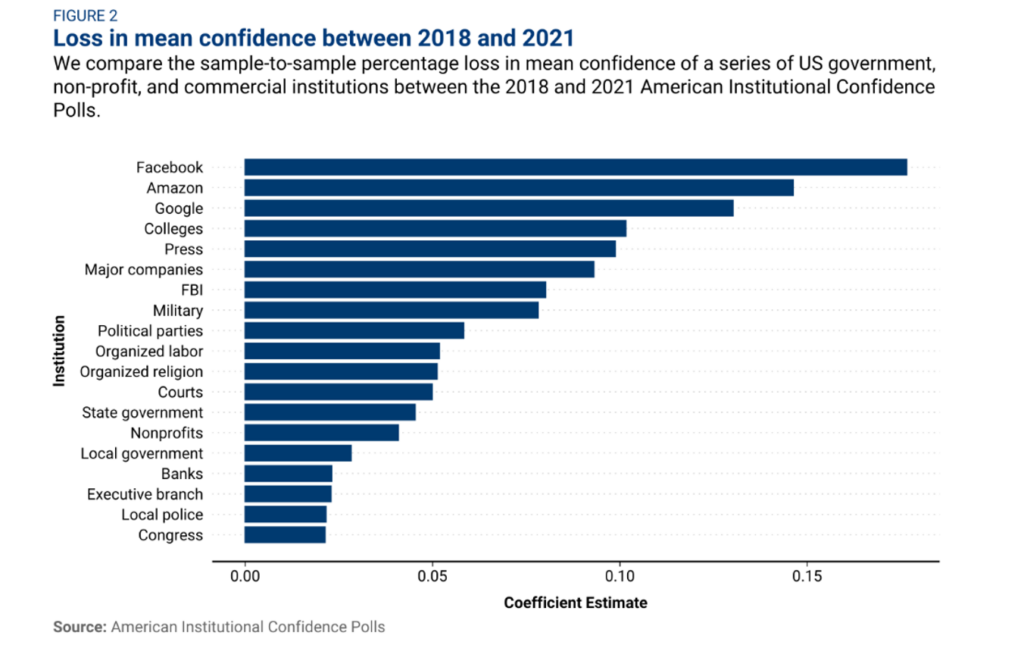Nearly all patients are concerned about their medical records getting leaked or breached, which is The State of Patient Privacy, the title of a consumer study from Health Gorilla with a headline finding that “Patients don’t trust Big Tech with their health data.”

With trust the “backbone” of health information exchange, Health Gorilla calls out, we have to face a big challenge here as health care enters its own sort of industrial revolution embedded AI and data analytics across the health/care ecosystem.
How to re-build trust with the very technology that can help health care, and also hurt individuals and communities?

Who’s most-trusted? Seven in ten U.S. patients are comfortable sharing their personal health information (PHI) with health care providers for treatment purposes. This is consistent with other studies’ findings that providers — first and foremost, one’s physician — is most consumers’ most-trusted health data steward in the healthcare ecosystem.
Health plans under-perform on trust and personal health data, as only 2 in 5 of patients are comfortable sharing their medical records with their health insurers.
The second chart illustrates peoples’ trust in Big Tech companies’ offering products or services to store consumers’ health data: net-net, 65% of folks, that’s 2 in 3 people, do not trust Big Tech’s offerings to store health data; only one-in-5 people slightly trust Big Tech, and only 14% “fully trust” Big Tech to hold PHI.
Fully 2 in 5 people do not trust Big Tech to hold personal health information at all.
Health Populi’s Hot Points: It’s informative and interesting to go back 9 years to a post I wrote here in Health Populi, discussing consumer research from Strategy&/PwC on consumers’ levels of trust with personal health data comparing tech companies, retailers, and health care providers as stewards of peoples’ PHI.
In their report on “the birth of the healthcare consumer,” the Strategy& survey found that roughly equal numbers of people in the U.S. would have trusted digitally-enabled companies and large retailers as much as health care providers in managing personal health data.
Nearly a decade later, it’s clear that patients have matured as health consumers with respect to appreciating the value of personal health information and access to it, along with greater appreciation for the frequency and scale of data breaches in health care organizations. 
In June 2023, Brookings Institution looked into how Americans’ confidence in technology firms has dropped, based on the American Institutional Confidence poll’s trends over the past five years.
While technology has become a “deeper and more integral part of people’s lives,” the analysis recognized, “these deeper ties between individuals and technology generated mixed effects and perhaps even more mixed feelings” in and in the wake of the COVID-19 pandemic.
The bar chart (labeled Figure 2 from Brookings’ report) shows the percentage loss in mean confidence in various institutions from largest decline to smallest. The biggest drops in confidence between 2018 and 2021 occurred with peoples’ trust in Facebook, Amazon, and Google above other institutions.
Sidebar for context: Note that confidence erosion in the U.S. Congress was relatively low, at the bottom of this chart, compared with other institutions. That may be because confidence in that particular institution was already low so had less opportunity to decline, based on for example the annual Gallup poll on honesty and ethics in professions discussed most recently here in Health Populi].
Technology companies had garnered high trust until the past few years, with a sentinel event for downfall in the Facebook/Cambridge Analytica event in 2018.
So this begs the big question — in the emerging fast-growing era of AI in health care, with Big Tech playing prominent roles in enabling the health care ecosystem in amassing and analyzing huge amounts of PHI and other personal data from the real-world that can help bolster each of our health care decisions and outcomes, how to bring the trust back to technology?
Companies will be working closely with the most-trusted data stewards in health care — providers, and especially our physicians. The secret in that sauce will be in that convergence, with transparency, clear opt-in and informed consents, enchanting design (addressing both privacy-by-design and health equity-by-design principles), and consumers’ and patients’ word-of-mouth.
As it happens, patients in fact can handle the truth and their data. And the FTC is also on the case now.




 I'm in amazing company here with other #digitalhealth innovators, thinkers and doers. Thank you to Cristian Cortez Fernandez and Zallud for this recognition; I'm grateful.
I'm in amazing company here with other #digitalhealth innovators, thinkers and doers. Thank you to Cristian Cortez Fernandez and Zallud for this recognition; I'm grateful. Jane was named as a member of the AHIP 2024 Advisory Board, joining some valued colleagues to prepare for the challenges and opportunities facing health plans, systems, and other industry stakeholders.
Jane was named as a member of the AHIP 2024 Advisory Board, joining some valued colleagues to prepare for the challenges and opportunities facing health plans, systems, and other industry stakeholders.  Join Jane at AHIP's annual meeting in Las Vegas: I'll be speaking, moderating a panel, and providing thought leadership on health consumers and bolstering equity, empowerment, and self-care.
Join Jane at AHIP's annual meeting in Las Vegas: I'll be speaking, moderating a panel, and providing thought leadership on health consumers and bolstering equity, empowerment, and self-care.